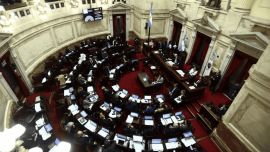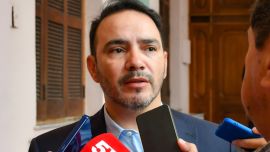A construction magnate who was little known at the start of the year surged into Colombia’s presidential run-off with a real chance at winning as voters coalesce against his leftist rival.
Rodolfo Hernández took 28 percent of the vote to 40 percent for Gustavo Petro, a former mayor of Bogotá and one-time guerrilla, the electoral authority said late Sunday. Hernández beat out Federico ‘Fico’ Gutiérrez, the main conservative candidate, who had 24 percent backing.
The result sets up a June 19 contest between Hernández, a populist whose policies are largely a blank slate, and a frontrunner in Petro who would phase out the oil and coal industries, effectively ripping up the economic model at a time when Colombia is enjoying a bonanza from high energy prices.
“Investors are mainly worried about the chance of a Petro victory, so they’ll view positively any scenario in which he doesn’t win,” said Andres Pardo, chief Latin America macro strategist at XP Investments in New York. “But the truth is that with Rodolfo Hernández, there’s a huge question mark.”
Peru and Chile have elected unconventional presidents in the past year, and Colombian voters too made clear their desire for change by rejecting candidates supported by more traditional parties. In all three countries, the pandemic aggravated deep inequality, and while Colombia’s economy has rebounded strongly, voters are struggling with issues including inflation, unemployment and corruption.
Markets are closed on Monday for a public holiday, but Colombian assets are likely to rally at the open on Tuesday, according to Pardo and Daniel Velandia of Credicorp Capital. That’s because third-placed Gutiérrez and many of his key supporters have already endorsed Hernández.
Hernández, Gutiérrez and a candidate of the political centre, Sergio Fajardo, took about 12 million votes between them compared to 8.5 million for Petro, potentially giving the businessman the upper hand in the run-off.
While Brazil, Mexico, Peru, Chile, Argentina and Venezuela have all elected left-wing leaders at various times in their histories, Colombia has until now only ever been governed by conservatives and liberals. President Iván Duque isn’t running, and Gutiérrez was seen as the continuity candidate of an unpopular administration.
“Most of Gutiérrez’s backers will go for Rodolfo,” said Sergio Guzmán, director of Colombia Risk Analysis. “What becomes critical now is for Hernandez to start putting a team together and start naming possible cabinet members.”
‘Dirty politics’
While Petro, 62, has served as mayor of the capital, a senator and has run for president before, Hernández, 77, is far less well known, and his stance on many issues remains unclear.
Hernández made a fortune building homes for low-income families and was mayor of the provincial city of Bucaramanga. He’s been compared to former US president Donald Trump for his brash and unpredictable style.
“Today, the country of dirty politics and corruption lost,” Hernández said, speaking by live video link from his kitchen in Bucaramanga.
His campaign team built a successful social media strategy driven by TikTok videos espousing his simple message that Colombia is being bled dry by corrupt politicians who should be in jail. He’s yet to say who would lead his economic team, or provide specifics on key issues.
All eyes will now turn to his policy proposals, Velandia said in a note. Hernández is usually portrayed in local media as a right-wing populist with an anti-establishment bent, and his plans include reducing the size of the state. But he also acknowledges “that the economic model has failed” and therefore needs to become more inclusive, Velandia wrote.
Petro wants to tax wealthy landowners, halt the awarding of oil exploration licences and restore ties with the socialist government of Venezuela. He was a member of an illegal guerrilla group in his late teens and twenties before getting into democratic politics.
Petro “will no longer have a monopoly on anti-establishment sentiment in Colombia,” said Andrés Mejía, a political consultant who teaches at the business school of Bogotá’s Andes University. “He will actually be facing a very strongly anti-establishment candidate.”
The election outcome is still highly uncertain, and several polls before the first round showed Petro winning the run-off.
In a speech to supporters in Bogotá, Petro said he’s one million votes away from the presidency. He attacked Hernández, saying “You don’t end corruption by talking on TikTok.”
Hernández has few allies in Congress, and to govern he would need to gain the support of the very lawmakers he has denounced as crooks. Petro also lacks a majority, and would need to reach out to centrist parties in order to pass laws.
US ally
Colombia has long been the strongest ally of the US in the region. The US government would prefer to work with Hernández than with Petro, “but it will still be a very bumpy ride,” said Adam Isacson of the Washington Office on Latin America, which studies human rights in the region.
A Petro win, on the other hand, would be likely to mean “tensions in the relation for the entire term, going from drug policy to Petro’s ties with traditional enemies of the US,” he said. “From the Pentagon’s perspective, any distance between the US and its closest ally in the hemisphere gives an advantage to other great powers like China and Russia.”
Petro wants to restore full diplomatic relations with neighbouring Venezuela, while Hernández says he wants to re-establish commercial relations.
The next president will inherit an economy that is set to grow 5.8 percent this year, the fastest among major economies in the Americas, according to forecasts from the Fund.
At the same time, inflation is running at a 21-year-high of 9.2 percent, led by a spike in food and energy costs which is particularly hitting poorer families.
“Rodolfo has a very good chance to unite voters, all those that want a change but not with the left,” said Silvana Amaya, an analyst at Control Risks consultancy in Bogotá. “He has better chances of beating Petro in a run-off than any other candidate would have had.”
related news
by Matthew Bristow & Andrea Jaramillo, Bloomberg























Comments